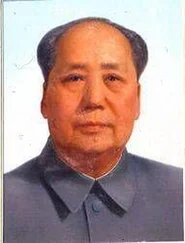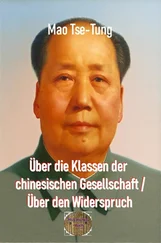Tse-tung Mao - The Little Red Book
Здесь есть возможность читать онлайн «Tse-tung Mao - The Little Red Book» весь текст электронной книги совершенно бесплатно (целиком полную версию без сокращений). В некоторых случаях можно слушать аудио, скачать через торрент в формате fb2 и присутствует краткое содержание. Жанр: Политика, на английском языке. Описание произведения, (предисловие) а так же отзывы посетителей доступны на портале библиотеки ЛибКат.
- Название:The Little Red Book
- Автор:
- Жанр:
- Год:неизвестен
- ISBN:нет данных
- Рейтинг книги:5 / 5. Голосов: 1
-
Избранное:Добавить в избранное
- Отзывы:
-
Ваша оценка:
- 100
- 1
- 2
- 3
- 4
- 5
The Little Red Book: краткое содержание, описание и аннотация
Предлагаем к чтению аннотацию, описание, краткое содержание или предисловие (зависит от того, что написал сам автор книги «The Little Red Book»). Если вы не нашли необходимую информацию о книге — напишите в комментариях, мы постараемся отыскать её.
The Little Red Book — читать онлайн бесплатно полную книгу (весь текст) целиком
Ниже представлен текст книги, разбитый по страницам. Система сохранения места последней прочитанной страницы, позволяет с удобством читать онлайн бесплатно книгу «The Little Red Book», без необходимости каждый раз заново искать на чём Вы остановились. Поставьте закладку, и сможете в любой момент перейти на страницу, на которой закончили чтение.
Интервал:
Закладка:
"Rectify the Party's Style of Work" (February 1, 1942), Selected Works, Vol. III, p. 44.
They [Communists] must grasp the principle of subordinating the needs of the part to the needs of the whole. If a proposal appears feasible for a partial situation but not for the situation as a whole, then the part must give way to the whole. Conversely, if the proposal is not feasible for the part but is feasible in the light of the situation as a whole, again the part must give way to the whole. This is what is meant by considering the situation as a whole.
"The Role of the Chinese Communist Party in the National War" (October 1938), Selected Works, Vol. II, p. 201.
Pleasure-seeking. In the Red Army there are also quite a few people whose individualism finds expression in pleasureseeking. They always hope that their unit will march into big cities. They want to go there not to work but to enjoy themselves. The last thing they want is to work in the Red areas where life is hard.
"On Correcting Mistaken Ideas in the Party" (December 1929), Selected Works, Vol. I, p. 113.
We must oppose the tendency towards selfish departmentalism by which the interests of one's own unit are looked after to the exclusion of those of others. Whoever is indifferent to the difficulties of others, refuses to transfer cadres to other units on request, or releases only the inferior ones, "using the neighbour's field as an outlet for his overflow", and does not give the slightest consideration to other departments, localities or people - such a person is a selfish departmentalist who has entirely lost the spirit of communism. Lack of consideration for the whole and complete indifference to other departments, localities and people are characteristics of a selfish departmentalist. We must intensify our efforts to educate such persons and to make them understand that selfish departmentalism is a sectarian tendency which will become very dangerous, if allowed to develop.
"Rectify the Party's Style of Work" (February 1, 1942), Selected Works, Vol. III, p. 46.
Liberalism manifests itself in various ways.
To let things slide for the sake of peace and friendship when a person has clearly gone wrong, and refrain from principled argument because he is an old acquaintance, a fellow townsman, a schoolmate, a close friend, a loved one, an old colleague or old subordinate. Or to touch on the matter lightly instead of going into it thoroughly, so as to keep on good terms. The result is that both the organization and the individual are harmed. This is one type of liberalism.
To indulge in irresponsible criticism in private instead of actively putting forward one's suggestions to the organization. To say nothing to people to their faces but to gossip behind their backs, or to say nothing at a meeting but to gossip afterwards. To show no regard at all for the principles of collective life but to follow one's own inclination. This is a second type.
To let things drift if they do not affect one personally; to say as little as possible while knowing perfectly well what is wrong, to be worldly wise and play safe and seek only to avoid blame. This is a third type.
Not to obey orders but to give pride of place to one's own opinions. To demand special consideration from the organization but to reject its discipline. This is a fourth type.
To indulge in personal attacks, pick quarrels, vent personal spite or seek revenge instead of entering into an argument and struggling against incorrect views for the sake of unity or progress or getting the work done properly. This is a fifth type.
To hear incorrect views without rebutting them and even to hear counter-revolutionary remarks without reporting them, but instead to take them calmly as if nothing had happened. This is a sixth type.
To be among the masses and fail to conduct propaganda and agitation or speak at meetings or conduct investigations and inquiries among them, and instead to be indifferent to them and show no concern for their well-being, forgetting that one is a CoMmunist and behaving as if one were an ordinary non-Communist. This is a seventh type.
To see someone harming the interests of the masses and yet not feel indignant, or dissuade or stop him or reason with him, but to allow him to continue. This is an eighth type.
To work half-heartedly without a definite plan or direction; to work perfunctorily and muddle along - "So long as one remains a monk, one goes on tolling the bell." This is a ninth type.
To regard oneself as having rendered great service to the revolution, to pride oneself on being a veteran, to disdain minor assignments while being quite unequal to major tasks, to be slipshod in work and slack in study. This is a tenth type.
To be aware of one's own mistakes and yet make no attempt to correct them, taking a liberal attitude towards oneself. This is an eleventh type.
"Combat Liberalism" (September 7, 1937), Selected Works, Vol. II, pp. 31-32.
Liberalism is extreme]y harmful in a revolutionary collective. It is a corrosive which eats away unity, undermines cohesion, causes apathy and creates dissension. It robs the revolutionary ranks of compact organization and strict discipline, prevents policies from being carried through and alienates the Party organizations from the masses which the Party leads. It is an extremely bad tendency.
Ibid ., p. 32.
People who are liberals look upon the principles of Marxism as abstract dogma. They approve of Marxism, but are not prepared to practise it or to practise it in full; they are not prepared to replace their liberalism by Marxism. These people have their Marxism, but they have their liberalism as well - they talk Marxism but practise liberalism; they apply Marxism to others but liberalism to themselves. They keep both kinds of goods in stock and find a use for each. This is how the minds of certain people work.
Ibid., pp. 32-33
The people's state protects the people. Only when the people have such a state can they educate and remould themselves by democratic methods on a country-wide scale, with everyone taking part, and shake off the influence of domestic and foreign reactionaries (which is still very strong, will survive for a long time and cannot be quickly destroyed), rid themselves of the bad habits and ideas acquired in the old society, not allow themselves to be led astray by the reactionaries, and continue to advance - to advance towards a socialist and communist society.
"On the People's Democratic Dictatorship" (June 30, 1949). Selected Works, Vol. IV, p. 418.*
It is not hard for one to do a bit of good. What is hard is to do good all one's life and never do anything bad, to act consistently in the interests of the broad masses, the young people and the revolution, and to engage in arduous struggle for decades on end. That is the hardest thing of all!
"Message of Greetings on the 60th Birthday of Comrade Wu Yu-chang" (January 15, 1940).
25. UNITY
The unification of our country, the unity of our people and the unity of our various nationalities - these are the basic guarantees of the sure triumph of our cause.
On the Correct Handling of Contradictions Among the People (February 27, 1957). 1st pocket ed., pp. 1-2.
It is only through the unity of the Communist Party that the unity of the whole class and the whole nation can be achieved, and it is only through the unity of the whole class and the whole nation that the enemy can be defeated and the national and democratic revolution accomplished.
"Win the Masses in Their Millions for the Anti-Japanese National United Front" (May 7, 1937), Selected Works, Vol. I, p. 292.*
We shall solidly unite all the forces of our Party on democratic centralist principles of organization and discipline. We shall unite with any comrade if he abides by the Party's Programme, Constitution and decisions.
Читать дальшеИнтервал:
Закладка:
Похожие книги на «The Little Red Book»
Представляем Вашему вниманию похожие книги на «The Little Red Book» списком для выбора. Мы отобрали схожую по названию и смыслу литературу в надежде предоставить читателям больше вариантов отыскать новые, интересные, ещё непрочитанные произведения.
Обсуждение, отзывы о книге «The Little Red Book» и просто собственные мнения читателей. Оставьте ваши комментарии, напишите, что Вы думаете о произведении, его смысле или главных героях. Укажите что конкретно понравилось, а что нет, и почему Вы так считаете.











